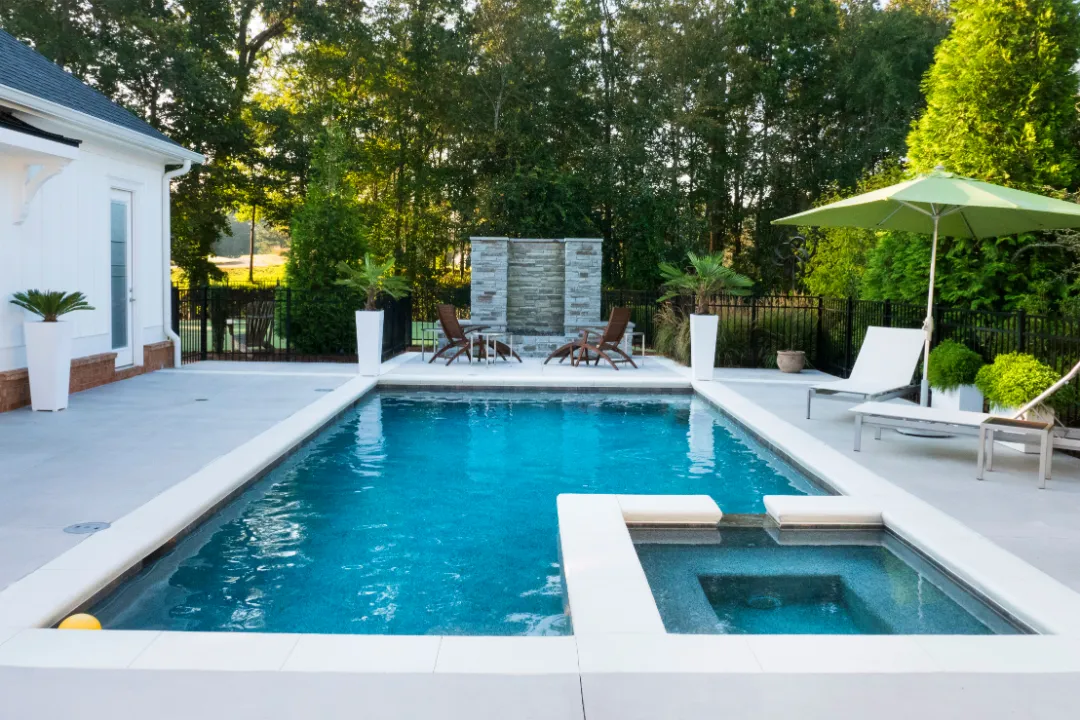Pool Decks of Palm Harbor Blog
Navigating the World of Pool Deck Contracting

Green and Gorgeous: Eco-Friendly Options for Sustainable Pool Decks
As we gather around the sparkling pool, basking in the warm sunlight, the idea of a sustainable and eco-friendly pool deck comes to mind. We envision a space that not only complements the beauty of nature but also minimizes our environmental impact. In this discussion, we will explore some green and gorgeous options that allow us to enjoy our pool while being mindful of the planet. From recycled materials to permeable pavers, there are various choices that not only enhance the aesthetics but also contribute to a more sustainable future. So, let's dive into the world of eco-friendly pool decks and discover the possibilities that await us.
Recycled Materials
Using recycled materials for pool decks is an environmentally friendly choice that helps reduce waste and promote sustainability. When it comes to eco-friendly options for pool decks, upcycled plastics and reclaimed materials are excellent choices. Upcycled plastics are materials that have been transformed from their original form into something new and useful. These materials are made from recycled plastic products such as bottles, containers, and bags. By using upcycled plastics for pool decks, we are not only preventing these materials from ending up in landfills but also reducing the demand for new plastic production.
Reclaimed materials, on the other hand, are salvaged from old structures or items and repurposed for new applications. These materials can include wood, bricks, stone, and even metal. By using reclaimed materials for pool decks, we are giving these materials a second life and reducing the need for new resources. In addition, the unique character and history of reclaimed materials can add charm and personality to a pool deck.
Natural Stone
When it comes to sustainable pool decks, one excellent option to consider is the use of natural stone. Natural stone offers durability, beauty, and an eco-friendly alternative to traditional decking materials. There are two popular ways to incorporate natural stone into your pool deck design: stone veneer and stone tiles.
Stone veneer is a thin layer of natural stone that is applied to the surface of your pool deck. It provides a seamless and luxurious look, while also protecting the underlying structure. Stone veneer is available in a variety of colors and textures, allowing you to create a unique and personalized pool deck design.
Another option is to use stone tiles for your pool deck. Stone tiles are cut into various shapes and sizes, offering flexibility in design. They can be installed in a pattern or randomly, depending on your preference. Stone tiles provide a natural and organic look, enhancing the overall aesthetic of your pool area.
Both stone veneer and stone tiles are sustainable options for your pool deck, as they are created from natural materials that are abundant and renewable. Additionally, natural stone requires minimal maintenance, making it a long-lasting and cost-effective choice.
Composite Decking
One popular choice for sustainable pool decks is composite decking. Composite decking is made from a combination of wood fibers and recycled plastic, making it an environmentally friendly option for those looking to reduce their carbon footprint. Not only does it help conserve natural resources, but it also offers a range of benefits.
One of the main benefits of composite decking is its durability. Unlike traditional wood decking, composite decking is resistant to rot, warping, and splintering, making it a long-lasting choice for pool decks. Additionally, composite decking is low maintenance, requiring only occasional cleaning with soap and water to keep it looking its best.
To maintain your composite decking, here are a few tips to keep in mind. First, be sure to sweep away any dirt or debris regularly to prevent buildup. If you notice any stains or spills, clean them up promptly to avoid potential staining. It's also recommended to use a non-abrasive cleaner when necessary and avoid using harsh chemicals that could damage the surface.
Sustainable Wood
We found that sustainable wood is a popular and eco-friendly choice for pool decks. When it comes to sustainable wood options, two materials that stand out are reclaimed timber and bamboo decking.
Reclaimed timber is a fantastic choice for those looking for a unique and environmentally friendly pool deck. It is sourced from old buildings, barns, and other structures, giving it a rustic charm. By repurposing old wood, we can reduce the demand for new timber and minimize deforestation. Reclaimed timber also has a natural durability that makes it resistant to rot and pests. It can withstand the harsh elements and last for many years with proper maintenance.
Another sustainable wood option for pool decks is bamboo decking. Bamboo is a rapidly renewable resource that grows much faster than traditional hardwoods. It is known for its strength and durability, making it a suitable choice for outdoor applications. Bamboo decking is also resistant to moisture and mold, making it an excellent option for pool areas. Additionally, bamboo has a beautiful natural aesthetic that adds a touch of elegance to any pool deck.
Permeable Pavers
Permeable pavers offer a sustainable solution for pool decks by allowing water to naturally drain through the surface. The installation process for permeable pavers involves excavating the existing ground to create a base layer. This base layer is then filled with a mixture of gravel and sand to create a stable foundation. The pavers are then laid on top of this base, leaving small gaps between them to allow for water drainage.
One of the main benefits of using permeable pavers for pool decks is their ability to reduce water runoff. By allowing water to drain through the surface, permeable pavers help to prevent the pooling of water, which can lead to slippery surfaces and increased risk of accidents. Additionally, permeable pavers can help to filter out pollutants and contaminants from the water as it seeps through the surface, promoting cleaner and healthier water in and around the pool area.
However, there are also drawbacks to consider when using permeable pavers. One potential drawback is the higher cost compared to traditional pavers or concrete. The installation process for permeable pavers can be more labor-intensive and time-consuming, which can contribute to the higher cost. Additionally, the small gaps between the pavers can require more maintenance, as debris and dirt can accumulate and potentially clog the drainage system.
Conclusion
Overall, there are plenty of eco-friendly options available for sustainable pool decks. Whether it's using recycled materials, natural stone, composite decking, sustainable wood, or permeable pavers, there are various choices to suit different preferences and budgets. By opting for these environmentally friendly materials, we can reduce our impact on the planet while still enjoying a beautiful and functional pool deck. So, let's make the green choice and create gorgeous pool decks that are both stylish and sustainable.
© Copyright 2026 Pool Decks of Palm Harbor. All Rights Reserved.
Terms & Conditions | Privacy Policy
Zip codes we serve:
33755,33757,33758,33766,33765,33756,33767,33769,34697,33763,34698,33770,33775,33779,33764,33761,33786,33771,33759,34695,34660,33778,33760,34682,33773,33774,34683,34681,34677,33785,34684,33762,33782,33777,33776,33772,33729,34685,33781,33780,33635,33744,33709,33716,34689,33708,33615,33626,33738,33702,34688,33714,33710,33607,33747,33634,33713,34692,33625,33703,34690,34691,33704,33731,33732,33733,33734,33736,33740,33742,33743,33784,33707,33609,33556,33730,34680,33701,33706,33614,33664,33624,33629,33616,33741,33611,34655,33688,34652,33712,33705,33608,33618,34656,34653,33621,33603,33606,33602,33646,33711,33601,33622,33623,33630,33631,33633,33650,33655,33660,33672,33673,33674,33675,33677,33679,33680,33681,33682,33684,33685,33686,33687,33689,33694,33604,33558,34673,33612,33548,33605,33613,34668,33549,33715,33620,34638,34654,33617,33610,33619,33637,33559,34674,33534,33570,33572,33571,33586,33575,33647,34669,33578,34637,33550,34667,34639,33510,33584


